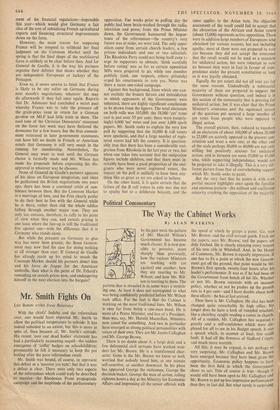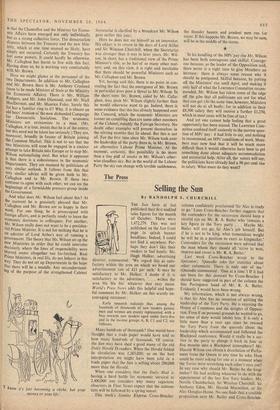Political Commentary
The Way the Cabinet Works
By ALAN WATKINS
IN the past week the pattern of Mr. Harold Wilson's Government has become much clearer. It is now pos- sible to perceive, more sharply than previously, how the various Ministers are working with (or against) one another; how they are reacting to Mr. Wilson; and how Mr. Wil- son is reacting to them. The pattern that is revealed is in some ways a surpris- ing one. At least it does not correspond to what was being confidently predicted before Mr. Wilson took office. For the fact is that the Cabinet is working on the most traditional lines. Mr. Wilson is very far from being a one-man band. He is more of a Prime Minister, and less of a President, than was, say, Mr. Harold Macmillan. Ministers now count for something. And two in particular have emerged as strong political personalities with voices of their own. They are Mr. James Callaghan and Mr. George Brown.
There is no doubt about it, a large desk and a few deferential civil servants have worked won- ders for Mr. Brown. He is a transformed char- acter. Gone is the Mr. Brown we knew so well, worried that nobody loved him, at one minute self-assertive, at another downcast. In his place has appeared George the statesman, George the decision-inaker, George the man of action, toiling eighteen hours a day at the Ministry for Economic Affairs and impressing all the senior officials with the speed at which he grasps a point. Go, says Mr. Brown; and the civil servant goeth. Fetch me the papers, says Mr. Brown; and the papers are duly fetched. He is clearly enjoying every minute of his new role in Whitehall. And, in the House of Commons, Mr. Brown is equally impressive. If one has to fix a point at which the new Govern- ment got off the ground, that point would be Mr. Brown's first speech, twenty-four hours after his leader's performance. It was as if he had been on the Government front bench all his life. Whether or not Mr. Brown succeeds with an incomes policy, whether or not he pushes up the growth rate to 4 per cent—and I have doubts about both these efforts—he has at last arrived.
Then there is Mr. Callaghan. He also has been changed quite remarkably by high office. No longer does he have a look of rumpled mischief, like a choirboy caught reading a comic in church. All of a sudden, Mr. Callaghan has acquired 3 gravity and a self-confidence which were dis- played for all to see in his Budget speech. It was a speech which, in manner at least, few could fault. It had all the firmness of Stafford Cripps, and much more warmth.
All this, it may be argued, is not perhaps so very surprising. Mr. Callaghan and Mr. Brown have emerged because they have been given the• opportunity. Economic policy happens to have been the first field in which the Government chose to act. This of course is true—though d would still have been open to Mr. Callaghan and Mr. Brown to put up less impressive performances than they in fact did. But what surely is surprising
is that the Chancellor and the Minister for Econo- mic Affairs have emerged not only individually but as a strong collective force. The demarcation disputes between the Treasury and the new Min- istry, which at one time seemed so likely, have simply not occurred. Certainly the Treasury has lost some powers. It could hardly be otherwise. Mr. Callaghan has learnt to live with this fact. Having done so, he is working very comfortably With Mr. Brown.
Here we might glance at the personnel of the two Departments. In addition to Mr. Callaghan and Mr. Brown there is Mr. Anthony Crosland (soon to be made Minister of State at the Ministry for Economic Affairs). There is Mr, William Rodgers, and Mr. John Diamond, and Mr. Niall MacDermot, and Mr. Maurice Foley. Surely this list has a familiar ring to it? Why, it is almost an old boys' reunion ol the now disbanded Campaign for Democratic Socialism. The economic Ministers are revisionists to a man. (Mr. Callaghan, it is true, insists that he is of the centre, but this need not be taken too seriously.) They are, moreover, broadly in favour of Britain joining the Common Market. This is not to say that the two Ministries will soon be engaged in a sinister attempt to take Britain into Europe or to stop Mr. Wilson nationalising steel. But what is apparent is that there is a cohesiveness in the economic Departments. They are manned by politicians of very similar outlook. It follows from this that very similar advice will be given both to Mr. Callaghan and to Mr. Brown. If these two continue to agree with each other, we can see the beginnings of a formidable pressure-group inside the Government.
And what does Mr. Wilson feel about this? At the moment he is genuinely pleased that Mr. Callaghan and Mr. Brown are so happy in their work. For one thing, he is preoccupied with foreign affairs, and is perfectly ready to leave the economic decisions to colleagues. For another, Mr. Wilson really does not want to be a presiden- tial Prime Minister. It is not for nothing that he is an admirer of Lord Attlee's way of running a government. The theory that Mr. Wilson set up the new Ministries in order that he could intervene decisively where the lines of responsibility were blurred seems altogether too far-fetched. Real Prime Ministers, in real life, do not behave in this Way. They do not set up Departments in the hope that there will be a muddle. Any misunderstand- ing of the purpose of the strengthened Cabinet know it's fast becoming a cliché, but your money or your life.' Secretariat is clarified by a broadcast Mr. Wilson gave earlier this year.
Here he does not see himself as an innovator. His object is to return to the days of Lord Attlee and Sir Winston Churchill, when the Secretariat was stronger than it was in later years. Mr. Wil- son, in short, has a traditional view of the Prime Minister's role, as he has of so many other mat- ters; and, on this view, it is right and inevitable that there should be powerful Ministers such as Mr. Callaghan and Mr. Brown.
Yet, having said this, there is no point in con- cealing the fact that the emergence of Mr. Brown in particular does pose a threat to Mr. Wilson. In the short term Mr. Brown, aided by Mr. Calla- ghan, may push Mr. Wilson slightly further than he would otherwise want to go. Indeed, there is some evidence that this has already happened over the Concord, which the economic Ministers are keener on cancelling than are some other members of the Cabinet, notably the Foreign Secretary. No doubt other examples will present themselves in the stirring months that lie ahead. But this is not all. For the first time since Mr. Wilson took over the leadership of the party there is, in Mr. Brown, an alternative Labour Prime Minister. At the moment, certainly, this possibility is no more than a tiny puff of smoke in Mr. Wilson's other- wise cloudless sky. But in the world of the Labour Party the sky can change with terrible suddenness, the thunder booms and prudent men run for cover. If this happens Mr. Brown, we may be sure, will be in the middle of the storm.
In his handling of the MPs' pay rise Mr. Wilson has been both courageous and skilful. Courage- ous because, as the leader of the Opposition said, there never is a right time to give Members an increase : there is always some reason why it should be postponed. Skilful because, by putting off the Ministers' rise until April, and making it only half of what the Lawrence Committee recom- mended, Mr. Wilson has taken some of the edge off the gibe that all politicians are out for what they can get. (At the same time, however, Ministers will not do at all badly; for in addition to their £8,500 salary they will receive a further £1,250, which in most cases will be free of tax.) And yet one cannot help feeling that a great opportunity has been missed. The Lawrence Com- mittee confined itself austerely to the narrow ques- tion of MPs' pay : it had little to say, and nothing to recommend, on MPs' conditions of work. Mem- bers may now find that it will be much more difficult than it would otherwise have been to get something done about adequate accommodation and secretarial help. After all, the voters will say, the politicians have already had a 90 per cent rise in salary. What more do they want?



































 Previous page
Previous page